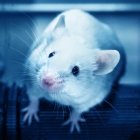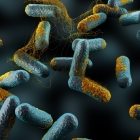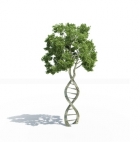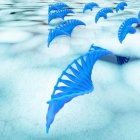Press monitoring
Epigenetic reboot reverses aging in mice and could extend lifespan
16.1.2023 | Press monitoring
Scientists at Harvard Medical School have investigated why we age, and identified a possible way to reverse it. In tests in mice, the team showed that epigenetic “software glitches” drive the symptoms of aging – and a system reboot can reverse them, potentially extending lifespan. Environmental and lifestyle factors like diet, exercise and even...
Genetically engineered bacterium enables biosynthesis of melanin nanoparticles
13.1.2023 | Press monitoring
Photothermal therapy (PTT) has attracted considerable attention for the treatment of tumors because it is minimally invasive and has spatiotemporal selectivity. Melanin is a kind of multifunctional pigment found widely in mammals, plants and microbes, with great prospects as a PTT agent for cancer treatment. Unfortunately, commercially available...
Resurrected 2.6-billion-year-old CRISPR enzymes can still edit cells
11.1.2023 | Press monitoring
Researchers in Spain have resurrected ancient CRISPR proteins from millions and even billions of years ago. Not only can they still edit human cells, but they’re more versatile than modern versions, paving the way for new and improved synthetic CRISPR gene-editing tools. For the new study, researchers at CIC nanoGUNE in Spain set out to chart the...
Mini human brains implanted in mice respond to light the animals see
9.1.2023 | Press monitoring
Miniature human brains, grown from stem cells and implanted into living mice, have for the first time been shown to respond to things the mice were seeing. The scientists were able to watch the responses in real time thanks to specialized graphene electrodes. In recent years, scientists have found a way to revert adult skin cells into an immature...
New cancer therapy and vaccine uses CRISPR to turn tumors into traitors
6.1.2023 | Press monitoring
Scientists at Brigham and Women’s Hospital (BWH) have found a way to fight cancer with cancer. The team genetically engineered cancer cells to release anti-cancer drugs at the site of established tumors, as well as stimulating the immune system against the disease. Tests in mice proved promising as both a therapy and a preventative...
Bacteria engineered to secrete rheumatoid arthritis drug in the body
4.1.2023 | Press monitoring
Instead of injections or pills, why not engineer bacteria to secrete therapeutic molecules from within our gut? A new study is demonstrating this futuristic idea, showing how a genetically modified probiotic can produce an experimental anti-inflammatory molecule and effectively treat rheumatoid arthritis in rats. "People don't like to have...
Breakthrough in plant breeding: Grafting and mobile CRISPR for genome editing in plants
2.1.2023 | Press monitoring
A ground-breaking twist to the CRISPR tool – aka "genetic scissors" – is being put to use to edit plant genomes by scientists from the Max Planck Institute of Molecular Plant Physiology, signaling a methodology change. The discovery, recently published in the journal Nature Biotechnology, could simplify and speed up the development of novel,...
Old trees could become renewable fuels this Christmas
30.12.2022 | Press monitoring
A new paper, published in the ACS Sustainable Chemistry & Engineering journal, found that pine needles could be used to produce renewable fuels and value-added chemicals, such as preservatives used in agriculture, using only water as a solvent. Between 6 and 8 million real Christmas trees are sold every year in the UK, with an estimated seven...
Screening a puppys DNA methylome may help predict how energetic or fearful they will be
28.12.2022 | Press monitoring
Anyone who's ever had a dog knows how different one can be from another. For example, they can be reserved or friendly, playful or calm, fearful or bold, and prone to bark or fetch or not. Research has shown that some of these differences are genetically determined. But even within dog breeds, where line breeding and artificial selection have led...
Hairpins made of artificial DNA clasp and kill cancer
26.12.2022 | Press monitoring
Researchers in Japan have demonstrated a promising new cancer treatment. The team developed artificial DNA sequences shaped like hairpins that latch onto molecules overexpressed in cancer and trigger a strong immune response. Drugs based on nucleic acids – the “NA” in DNA and RNA – are emerging as a new technique to treat a range of diseases....































